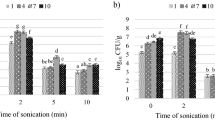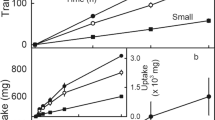Abstract
SAMISH et al.1 reported that “bacteria are found quite regularly within the tissue of apparently healthy tomatoes”. Since some of the family types they found have species which produce cellulase2, it was deemed necessary to determine beyond doubt that the cellulase reported by Hall3 was produced by the tomato fruit tissues and not by micro-organisms which might be within the fruits.
This is a preview of subscription content, access via your institution
Access options
Subscribe to this journal
Receive 51 print issues and online access
$199.00 per year
only $3.90 per issue
Buy this article
- Purchase on Springer Link
- Instant access to full article PDF
Prices may be subject to local taxes which are calculated during checkout
Similar content being viewed by others
References
Samish, Z., Etinger-Tulczynska, R., and Bick, M., Annals Microbiol., 9, 20 (1961).
Gascoigne, J. A., and Gascoigne, M. M., Biological Degradation of Cellulose (Butterworth and Co. Ltd., 1960).
Hall, C. B., Nature, 200, 1010 (1963).
Bell, T. A., Etchells, J. L., and Jones, I. D., U.S. Dept. Agric. ARS–72–5 (1955).
Author information
Authors and Affiliations
Rights and permissions
About this article
Cite this article
HALL, C., MULLINS, J. Cellulase Activity in Sterile Tomato Fruits. Nature 206, 638–639 (1965). https://doi.org/10.1038/206638a0
Issue Date:
DOI: https://doi.org/10.1038/206638a0
Comments
By submitting a comment you agree to abide by our Terms and Community Guidelines. If you find something abusive or that does not comply with our terms or guidelines please flag it as inappropriate.



